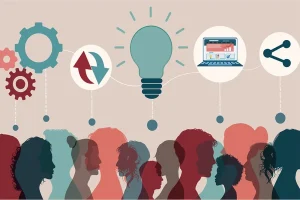Social Media & Mental Health: Navigating the Challenges

In today’s digital age, social media plays a dominant role in our daily lives. It connects us to friends, family, and the world around us. It provides a platform for entertainment, self-expression, and even education. But along with these benefits, social media also brings forth significant challenges, especially when it comes to mental health. From feelings of inadequacy to anxiety over social comparisons, the effects of social media on mental well-being are complex and multifaceted.
In this article, we’ll explore the relationship between social media and mental health, the challenges it poses, and how we can navigate these challenges to maintain a healthy balance.
The Influence of Social Media on Mental Health
Social media platforms, such as Facebook, Instagram, Twitter, TikTok, and others, are designed to be engaging. They encourage users to interact, share, and consume content continuously. As a result, these platforms can easily consume large portions of our time and attention, sometimes without us even realizing it.
However, the influence of social media on mental health is not purely negative. For some, it provides a sense of community, access to valuable information, and a platform to share creative work. For others, it can lead to feelings of isolation, anxiety, and depression. Understanding how social media affects mental health requires a closer look at both the positive and negative aspects.
Positive Effects of Social Media on Mental Health
-
Connection and Support: Social media allows individuals to connect with people worldwide, including friends and family who may live far away. It can also provide opportunities for those facing mental health challenges to find support groups or communities of like-minded individuals. Whether it’s a group for people dealing with a specific illness, a platform for sharing creative work, or a space to discuss mental health openly, these connections can be a source of comfort and healing.
-
Educational Resources: Social media offers countless opportunities for learning, from mental health awareness campaigns to tips for self-care and mindfulness. Educational accounts, influencers, and organizations frequently share evidence-based advice, which can help individuals improve their mental well-being.
-
Expression and Creativity: Platforms like Instagram, TikTok, and YouTube have become outlets for creativity. People can share their personal stories, artistic projects, or hobbies, leading to a sense of accomplishment, self-expression, and joy. This positive engagement helps individuals maintain a healthy emotional state by providing an outlet for their thoughts and creativity.
-
Raising Awareness: Social media has played a major role in raising awareness about mental health. Through hashtags, campaigns, and influencers, the stigma surrounding mental health issues has diminished in some communities. This has led to an increase in conversations around mental illness, allowing people to seek help or offer support to others in need.
Negative Effects of Social Media on Mental Health
-
Social Comparison: One of the most prominent negative effects of social media is social comparison. On platforms like Instagram, people often post their most curated, filtered, and glamorous moments. This can lead to feelings of inadequacy or jealousy in those who view these posts. Constantly comparing oneself to others can cause individuals to feel like they are not measuring up or living up to unrealistic standards, which can negatively impact self-esteem and body image.
-
Fear of Missing Out (FOMO): Social media amplifies the fear of missing out, or FOMO. As users scroll through their feeds, they are exposed to images of others attending parties, traveling, or enjoying social activities. This can create feelings of exclusion or loneliness for those who feel left out or disconnected from these experiences. FOMO can also lead to excessive social media usage, as individuals constantly check their feeds in an attempt to feel included.
-
Addiction and Time Wasting: Social media platforms are designed to be addictive. The constant notifications, likes, and comments keep users hooked, making it difficult to unplug. Prolonged use can lead to decreased productivity, disrupted sleep patterns, and a general lack of time for offline activities. Social media addiction can also contribute to feelings of anxiety, depression, and dissatisfaction with life.
-
Cyberbullying and Online Harassment: Another major downside of social media is the prevalence of cyberbullying and online harassment. With the anonymity that the internet provides, some users feel empowered to post hurtful or damaging comments. This can lead to feelings of shame, humiliation, and even suicidal ideation in extreme cases. The emotional toll of online bullying can be devastating and long-lasting for the individuals affected.
-
Distorted Reality and Unrealistic Expectations: The tendency to showcase only the “highlight reel” of life on social media creates a distorted version of reality. This can lead to unrealistic expectations and dissatisfaction with one’s own life. For example, individuals may see friends posting about their perfect vacations, relationships, or jobs and feel like their lives are lacking in comparison. This distorted reality can erode mental well-being over time, especially if one is unable to separate the curated online persona from real life.
Navigating the Challenges of Social Media and Mental Health
While social media presents various challenges for mental health, it’s not all bad. By adopting mindful practices and strategies, we can mitigate the negative effects and harness the positive aspects of these platforms. Here are some tips for navigating the challenges of social media and maintaining mental well-being:
1. Set Boundaries and Limit Usage
One of the most effective ways to protect mental health is by setting boundaries for social media usage. This could mean designating specific times to check social media, setting time limits for daily usage, or choosing to have a social media-free day each week. Using features like “Do Not Disturb” or limiting screen time can help keep social media from becoming an overwhelming force in your life.
2. Be Selective with Your Feed
Follow accounts that inspire, uplift, and educate rather than those that contribute to feelings of inadequacy or comparison. Curate your feed to include content that supports your mental health and personal growth. Unfollow accounts that make you feel negative or anxious, and surround yourself with positive, supportive communities.
3. Practice Digital Detox
A digital detox, where you take a break from all digital devices, can have profound benefits for mental well-being. This can help reduce anxiety, stress, and the negative impact of constant connectivity. Regular digital detoxes, whether for a few hours, a full day, or a weekend, allow you to reconnect with yourself and your surroundings without the distractions of social media.
4. Engage in Positive, Authentic Conversations
If you’re going to use social media, aim to engage in meaningful, authentic conversations. Share your own experiences, offer support to others, and contribute to conversations about mental health. Being open about your struggles and triumphs can foster a sense of connection and help break the stigma surrounding mental health.
5. Seek Help When Needed
If social media is negatively affecting your mental health, don’t hesitate to seek support. Therapy, counseling, or talking to a trusted friend or family member can help you navigate these challenges. If you’re experiencing cyberbullying or online harassment, reach out to the platform’s support team or a mental health professional for advice on how to cope.
Conclusion
Social media is a powerful tool that can influence mental health in both positive and negative ways. While it offers opportunities for connection, support, and education, it also presents challenges such as social comparison, addiction, and cyberbullying. By being mindful of our social media habits and setting boundaries, we can harness the positive aspects of social media while minimizing its potential harm.
In the end, it’s important to remember that social media is just one part of our lives. By practicing self-care, being selective about what we consume online, and seeking help when needed, we can ensure that our digital interactions contribute to, rather than detract from, our mental well-being.








